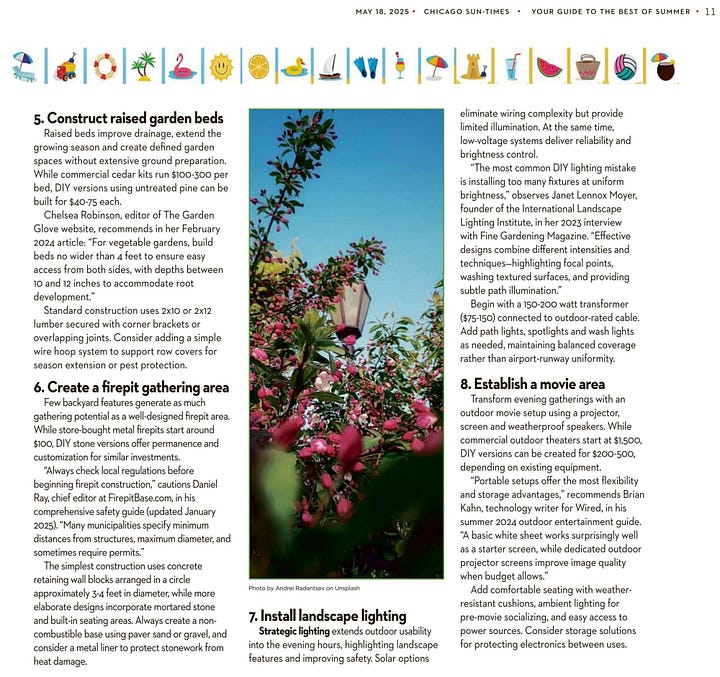The Chicago Sun-Times Published an AI-Generated Summer Reading List Full of Fake Books — And This is Just the Beginning
The Sun-Times' publishing of fake books shows what happens when media outlets hollow out their newsrooms and replace humans with tech.
The Chicago Sun-Times just published a summer reading list with one major problem: most of the books don't exist. Titles like Tidewater Dreams by Isabel Allende and The Last Algorithm by Andy Weir sound plausible enough, but they're completely fictional—fabricated by AI and published without anyone catching the error. Of the fifteen books recommended in the list, a full ten of them are entirely made up.
According to 404 Media, Marco Buscaglia, who created the content, admitted that the list was AI-generated. "I do use AI for background at times but always check out the material first. This time, I did not and I can't believe I missed it because it's so obvious. No excuses," Buscaglia told 404 Media. "On me 100 percent and I'm completely embarrassed."
The article appeared in a 64-page promotional section called "Heat Index," which wasn't specific to Chicago but was designed as a generic insert for various publications across the country. Despite being published in the Sun-Times, it wasn't created or approved by the newspaper's editorial team. After the fake books were spotted and went viral on Bluesky, the Sun-Times posted: "We are looking into how this made it into print as we speak. It is not editorial content and was not created by, or approved by, the Sun-Times newsroom. We value your trust in our reporting and take this very seriously."
According to Ars Technica's analysis, only five of the fifteen recommended books in the list actually exist, with the rest being hallucinated titles falsely attributed to real authors. Books by Isabel Allende, Andy Weir, Brit Bennett, Taylor Jenkins Reid, Min Jin Lee, Percival Everett, Delia Owens, Rumaan Alam, Rebecca Makkai, and Maggie O'Farrell don't exist, while a handful of others mentioned are real.
This is exactly the kind of thing that happens when AI gets deployed as a way to cut costs. And it's going to keep happening.
The most telling aspect of this story isn't the AI failure itself — we all know AI hallucinates facts — it's the context in which it happened.
The publication error comes just two months after the Chicago Sun-Times lost 20 percent of its staff through a buyout program. In March, the newspaper's nonprofit owner, Chicago Public Media, announced that 30 Sun-Times employees — including 23 from the newsroom — had accepted buyout offers amid financial pressures. According to the Sun-Times' own reporting, this was "the most drastic the oft-imperiled Sun-Times has faced in several years." Those leaving included columnists, editorial writers, and editors with decades of experience.




Let's connect the dots here. Media company cuts 20% of its staff, including experienced editors. Two months later, AI-generated nonsense makes it into print without anyone catching it. Are we really surprised?
This is the direct result of the continued hollowing out of the media industry. You can't fire all your fact-checkers and editors and then act shocked when nobody catches glaring errors before publication. You can't replace experienced journalists with AI and expect the same quality. And you certainly can't expect overworked, underpaid freelancers to carefully vet every piece of content when they're responsible for filling 64-page supplements basically on their own.
Buscaglia told 404 Media he did this as part of a "promotional special section" that wasn't supposed to be targeted to any specific city. "It's supposed to be generic and national," he said. "We never get a list of where things ran." That statement alone tells you everything you need to know about how little editorial oversight was involved in this process.
The part that really gets me is that this wasn't complex investigative journalism. It was a summer reading list. If AI can't get that right—and a human can't be bothered to check if books actually exist before publishing—how can we trust these same systems and workflows for anything more substantial?
Of course, some will use this incident to declare that the sky is falling and blame AI for everything wrong with journalism. But that misses the point. AI is just a tool — it's the continued corporate disinvestment in human journalists, editors, and fact-checkers that's the real problem.
As one angry Reddit user put it: "As a subscriber, I am livid! What is the point of subscribing to a hard copy paper if they are just going to include AI slop too!?" The sentiment is understandable, but the anger is misdirected. The issue isn't AI itself — it's media companies thinking they can fire their staff and replace them with technology, without investing in the human oversight needed to make that technology useful rather than harmful.
This incident at the Sun-Times is just a preview of what's coming as more media outlets cut staff while simultaneously pushing AI integration. We're going to see more hallucinated books, more fabricated facts, and more erosion of trust.
What happened at the Sun-Times is embarrassing, but it's also a warning. This is what happens when you strip newsrooms of the human expertise they need to function.
Maybe next time, someone will at least Google the books before publishing the list.






I am more sympathetic to the angry Reddit user. I think their response is valid and could be easily directed at the the anonymous "they" in the screed: i.e. the paper's owners. I have canceled my subscriptions to the WaPo and the L.A. Times over editorial decisions made by their owners. I see the inclusion of AI slop as an editorial error. At least for now, there are still humans who own these media, and I think they bear the full responsibility in the end for what goes into their publications. (edited for minor typos)
Why don’t they take this one step further and ask AI to write the made-up books? Problem solved!